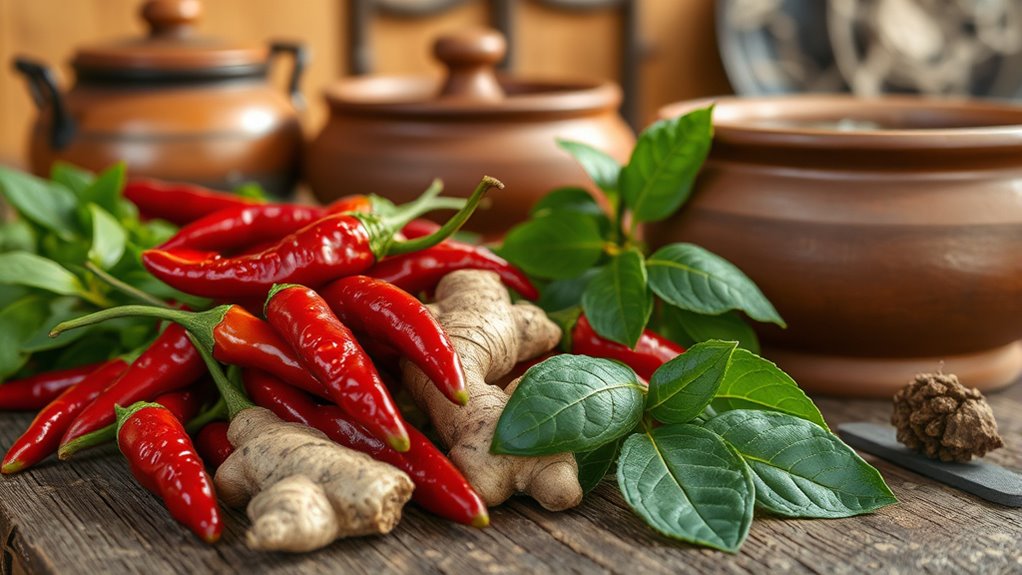Nigerian pepper soup combines herbs and spices like ginger, garlic, alligator pepper, and calabash nutmeg, which have long been used for their medicinal properties. These ingredients are believed to boost immunity, fight inflammation, and help clear congestion, making the soup a natural remedy during illness or fatigue. Its preparation maximizes the active compounds that promote healing and wellness. If you keep exploring, you’ll discover more about the rich tradition behind this nourishing, medicinal dish.
Key Takeaways
- Nigerian pepper soup combines herbs and spices known for their anti-inflammatory and immune-boosting properties.
- Traditional preparation methods maximize medicinal compounds in ingredients like ginger, garlic, and alligator pepper.
- The soup’s warm, spicy nature helps clear congestion and promotes recovery during illness.
- Regional variations reflect local herbal knowledge, emphasizing herbs’ role in natural healing.
- The dish exemplifies the Nigerian cultural practice of integrating food and herbal medicine for health support.

Nigerian pepper soup is a flavorful and comforting dish that captures the essence of West African cuisine. But beyond its delicious taste, it holds a deep connection to traditional medicinal practices. For generations, people have used this soup not just as a meal but as a form of herbal remedy. The herbs and spices incorporated into the soup are carefully selected for their healing properties, making it a natural remedy for various ailments. When you prepare Nigerian pepper soup, you’re not only creating a flavorful dish but also tapping into a centuries-old tradition of using herbs to promote health and well-being.
The spice combinations in Nigerian pepper soup are more than just flavor enhancers; they’re integral to its medicinal roots. Ingredients like calabash nutmeg, alligator pepper, ginger, and garlic are common in the recipe. These spices are known for their anti-inflammatory, antimicrobial, and immune-boosting properties. For example, ginger and garlic are widely recognized for their ability to fight colds, reduce inflammation, and improve digestion. When you combine these spices, you’re creating a potent herbal remedy that can help alleviate symptoms of cold, flu, or fatigue. The balance of heat and aroma in the spice mix is carefully crafted to maximize their health benefits while delivering a comforting flavor.
Herbal remedies are deeply embedded in Nigerian culture, and pepper soup is one of the most popular ways to utilize herbs for medicinal purposes. Traditionally, the soup is prepared when someone is feeling unwell, with the belief that the warm, spicy broth can help clear congestion, boost immunity, and promote recovery. The herbs and spices are often used in their unprocessed forms, preserving their natural medicinal qualities. As you cook, the herbs release their active compounds into the broth, making each spoonful a potent dose of healing. Additionally, the use of high-quality spices and proper preparation techniques can enhance the color accuracy of the dish, making it visually appealing and more enticing for consumption.
You might notice that recipes vary across regions, but the core idea remains the same: combining specific herbs and spices to create a dish that’s both nourishing and medicinal. Whether you’re experiencing a cold or simply want to support your immune system, Nigerian pepper soup offers a natural, flavorful way to do so. Its medicinal roots are a testament to the wisdom of traditional Nigerian herbal remedies, where food and healing go hand in hand. By exploring these spice combinations, you connect with a rich cultural heritage that values health, flavor, and community.
Frequently Asked Questions
What Are the Key Medicinal Herbs Used in Nigerian Pepper Soup?
In Nigerian pepper soup, you’ll find key medicinal herbs like calabash nutmeg, scent leaf, and ginger, which are part of its herbal combinations. These herbs are known for their healing properties, helping with digestion and colds. The spice variations, including alligator pepper and cloves, enhance flavor and medicinal benefits. By choosing the right herbs and spice combinations, you can enjoy a flavorful soup with health-boosting effects.
How Does Pepper Soup Help in Boosting Immunity?
Imagine your immune system as a fortress, and each sip of pepper soup as a fiery shield. The spicy peppers and herbs act like vigilant guards, boosting your body’s ability to defend against pathogens. This warming brew stimulates circulation, enhances white blood cell activity, and fortifies your immune response. So, when you indulge in pepper soup, you’re arming your body’s defense system, making it more resilient against illness and infection.
Are There Any Traditional Rituals Associated With Serving Pepper Soup Medicinally?
When serving pepper soup medicinally, you often participate in a traditional blessing or a ceremonial preparation that honors its cultural significance. These rituals might involve prayers, offerings, or specific gestures to invoke health benefits and protection. You’re encouraged to approach this process with reverence, respecting the customs passed down through generations. Such practices enhance the soup’s healing properties and deepen your connection to the cultural roots behind this nourishing tradition.
Can Pepper Soup Be Used to Treat Specific Illnesses or Conditions?
They say, “An apple a day keeps the doctor away,” but herbal remedies like pepper soup also offer healing. You might use Nigerian pepper soup to treat colds, stomach issues, or fever, as part of traditional healing practices. While not a substitute for medical advice, it’s valued for its warming, medicinal properties, making it a comforting, natural remedy rooted in centuries of cultural wisdom.
How Has the Recipe for Medicinal Nigerian Pepper Soup Evolved Over Time?
You’ll find that the recipe for medicinal Nigerian pepper soup has evolved through historical influences and culinary adaptations. Traditional ingredients like local spices and herbs have blended with modern flavors, creating a richer, more diverse dish. As tastes change and new ingredients become available, you notice how the recipe adapts while still honoring its roots. This evolution reflects Nigeria’s vibrant culinary history and ongoing creativity in maintaining the soup’s medicinal and cultural significance.
Conclusion
As you savor Nigerian pepper soup, remember it’s more than just a comforting dish—it’s rooted in centuries of medicinal tradition. Did you know that studies show spicy foods can boost your immune system and improve circulation? So next time you enjoy a warm bowl, you’re not only indulging your taste buds but also embracing a rich history of healing. Keep exploring these culinary secrets, and you’ll discover how food truly heals from within.









